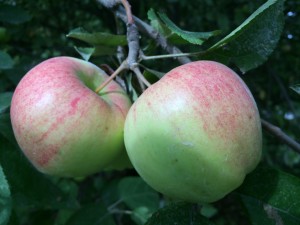 In the western hemisphere there is an old saying, “an apple a day keeps the doctor away”. Though this expression seems old, outdated, and simplistic; there is some truth to it. Apples have quite the diverse set of health benefits and health promoting properties that make it a mean power food!
In the western hemisphere there is an old saying, “an apple a day keeps the doctor away”. Though this expression seems old, outdated, and simplistic; there is some truth to it. Apples have quite the diverse set of health benefits and health promoting properties that make it a mean power food!
Components of Apples
Surprisingly, one of the most beneficial components of an apple is its skin. The skin of the apple contains approximately 50% of the insoluble fiber and vitamin C content of an apple. In addition to containing vitamin C and insoluble fiber, apples also contain a healthy dose of antioxidants, quercetin (great for allergies and inflammation), pectin (helps prevent cholesterol from building in blood vessels), and B vitamins.
Therapeutic Potential
Based on the components listed above, apples may have some of the following health benefits (most of which have been researched and proven):
- Reduced risk of lung cancer by 50% with regular apple consumption
- Reduced risk of cardiovascular disease by 13-22%
- Reduced risk of stroke
- Reduced LDL (Bad) cholesterol by 23% in individuals who ate an apple every day for six months
- Increased HDL (Good) cholesterol by 4% in individuals who ate an apple every day for six months
- Reduced risk of asthma
- Improved lung functioning
- Reduced risk of type II diabetes
- Reduced blood glucose levels
- May inhibit cholera toxin (still being explored)
- Increased potential to lose weight with consumption of three apples per day (this is due to the insoluble fiber mentioned earlier)
Storing and Processing
With many fruits and vegetables, storing them for any length of time decreases the nutritional impact that it can have. However, apples can be stored for 60 days with little to no impact on their nutritional quality. Research has shown that after 60 days of cold storage, apples had the same antioxidant potential as they did when compared to day 1. This trend is not consistent across different apple types though. For example, a red delicious apple will retain its nutritional quality far longer than a golden delicious apple.
The processing of apples and the impact on their nutritional benefits rests mainly in whether the peal is used. Ultimately, the apples will be more beneficial if the peal is intact. In addition, when the pulp of the apple is disposed of, for example in juicing, much of the potential health benefits are lost. When an apple is juiced, it has only 10% of the antioxidant potential of a whole apple that is eaten. Does this mean that juicing an apple is not good for you? Of course not. Adding an apple to your juice can add a nice flavour, it simply may not provide as much of a health benefit as you would think.
What about pesticides?
Much like other fruits and vegetables, pesticides are commonly used on apples. Some would argue that this is to a greater extent on apples than other fruits. Ultimately, this does bring up concerns about eating them and how to best clean them. The best way to clean an apple is probably the simplest. All that is necessary is using water and rubbing the skin of the apple. Because there are only low levels of pesticide residue on the surface of the apples, this method of cleaning the apple keeps many beneficial properties of the apple intact while still removing majority of the pesticides from the surface. However, for those more sensitive to chemicals, a more thorough approach may be needed.
Have you benefitted from reading this blog? Know someone that would benefit as well? Share, Like, Comment, or Tweet this article, and let me know what you think.
Some of the information provided above may not be appropriate for everyone, please consult with your doctor before trying any of the above. If you are interested in Naturopathic Medicine and wanting a different approach to your health care needs, contact Elisha Cook via the contact portion of this website.
Sources:
http://www.livescience.com/44686-apple-nutrition-facts.html
http://www.biomedcentral.com/content/pdf/1475-2891-3-5.pdf%C3%AF%C2%BF%C2%BD%C3%83%C5%93

